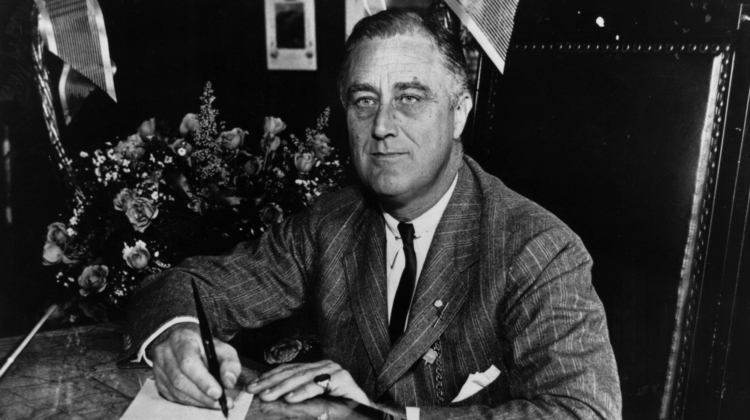Franklin D. Roosevelt’s Terrible Legacy
How Americans came to think the government would solve all their problems.

|
Getting your Trinity Audio player ready...
|
In his first inaugural address on March 4, 1933, the architect of the New Deal, Franklin Delano Roosevelt, declared that fear was all that Americans should fear. He also attempted to lower expectations for an economic recovery by trying to convince the nation that material prosperity wasn’t all it was cracked up to be. “Happiness,” he declared sonorously, “lies not in the mere possession of money; it lies in the joy of achievement, in the thrill of creative effort.” He continued, “The joy and moral stimulation of work no longer must be forgotten in the mad chase of evanescent profits….” He called on Americans to recognize “the falsity of material wealth as the standard of success.”
During his 1936 reelection campaign, Roosevelt reiterated his determination to redistribute wealth, adapting the Marxist slogan “From each according to his ability, to each according to his needs” in saying: “Here is my principle: Taxes shall be levied according to ability to pay. That is the only American principle.”
As was so often the case with Roosevelt, this sounded better than it was. A graduated income tax has been in place in America for many years, but that doesn’t negate the fact that penalizing wealthier Americans by forcing them to pay higher taxes only decreases their ability and reduces their incentive to maintain businesses that provide jobs for ordinary citizens. A genuine “American principle” would be to tax everyone equally, which would naturally result in the wealthy paying more anyway.
As the Great Depression dragged on, perhaps there were some Americans who comforted themselves with the realization that they were not corrupted by “the falsity of material wealth.” They had scant other comfort. In May 1939, halfway through Roosevelt’s lengthy presidency, Secretary of the Treasury Henry Morgenthau went before the House Ways and Means Committee and frankly admitted that the New Deal had been an abject failure. “We have tried spending money,” declared Morgenthau. “We are spending more than we have ever spent before and it does not work…. I want to see this country prosperous. I want to see people get a job. I want to see people get enough to eat. We have never made good on our promises…. I say after eight years of this Administration we have just as much unemployment as when we started…and an enormous debt to boot!”
Morgenthau was right. The economy recovered more slowly during the Great Depression than it did from any other economic crisis in the nation’s history. Nor was the New Deal’s damage limited solely to the fact that it didn’t work. From the empty sagacity of proclamations like “the only thing we have to fear is fear itself” to his fireside chats, in which he explained his policies and reassured listeners about the Depression and the war, Roosevelt brought the full force of his considerable personal charm to give Americans the impression that, in the midst of its two worst-ever crises, the nation was in the care of a calm, competent leader who would see them through.
Roosevelt’s avuncular and patrician public persona, combined with the New Deal’s complex of social programs, gave tremendous impetus to the assumption that if George Washington was the Father of His Country, Franklin D. Roosevelt was the Nation’s Dad: calming, in control, and offering comprehensive care for the basic needs of his children, the citizens of the republic. Radio offered him the chance to speak directly to the American people as they sat in their living rooms. For the first time, the president of the United States became a local politician, as close as the local city councilman. This contributed a great deal to the sense that he was the kindly national father figure.
Because of the example FDR set, his successors were widely considered to be responsible for national morale to a much greater extent than were his predecessors. And Americans began, more than ever, to look to the federal government to solve all their problems—not only to help them make ends meet, but to carry them through an ever-increasing range of life’s difficulties. The line is direct from the New Deal to the Ohio woman who cried out during the 2012 election, “Keep Obama in president, you know! He gave us a phone, he’s gonna do more.”
Numerous commentators at that time pointed out that there was no government free-phone program; the phones were actually reduced to bargain-basement prices for those on the welfare rolls. They were both splitting hairs and missing the point. The Obamaphone woman provided evidence of the fact that by 2012, eighty years after Roosevelt was elected, many Americans took for granted that one of the government’s primary functions was to bestow various forms of largesse upon the American people, using money taken from productive Americans to do so.
That is Franklin Delano Roosevelt’s most enduring, and most damaging, legacy.

